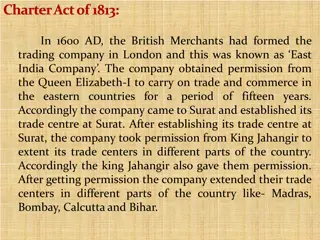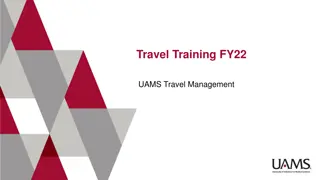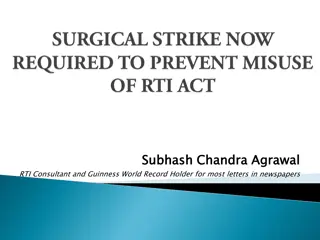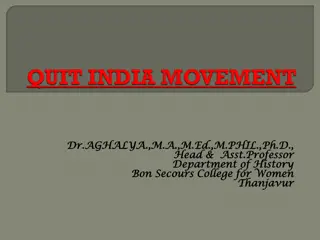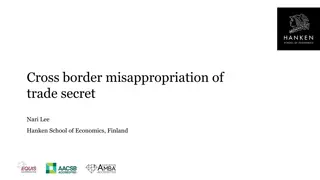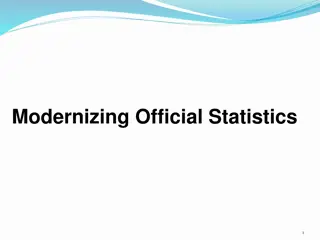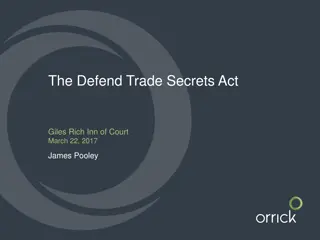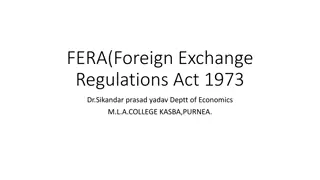Overview of the Official Secrets Act, 1923 in India
The Official Secrets Act, 1923 in India focuses on protecting official records of the Central and State Governments, safeguarding information privacy, and imposing penalties for activities prejudicial to the State's interests. Rooted in the British colonial era, the Act aims to maintain national security, sovereignty, and integrity by regulating the disclosure of official secrets. Learn about its historical background, objectives, and provisions regarding privacy protection and official secrecy.
Download Presentation

Please find below an Image/Link to download the presentation.
The content on the website is provided AS IS for your information and personal use only. It may not be sold, licensed, or shared on other websites without obtaining consent from the author. Download presentation by click this link. If you encounter any issues during the download, it is possible that the publisher has removed the file from their server.
E N D
Presentation Transcript
LL.M. SEMESTER II COURSE CODE : 204E (GR-B) COURSE TITLE : COMPARATIVE ADMINISTRATIVE LAW UNIT V : STATE PRIVILEGE TO REFUSE PRODUCTION OF DOCUMENTS IN COURTS, RIGHT TO INFORMATION AND OFFICIAL SECRETS ACT 5.3 THE OFFICIAL SECRETS ACT, 1923 (INDIA) Presented by Dr. Sangeeta Chatterjee Assistant Professor Department of Law, Bankura University
INTRODUCTION The Official Secrets Act, 1923 covers the Privacy and secrecy of official records of the Central and State Governments. In fact, its a Privacy protection legislation and it protects the Information Privacy of the Governmentrecords. It has created provisions for imposing penalty for spying in order to communicate or publish secret official codes and acting for any purpose prejudicial to the safety or interests of the State. It has also created penalties for the communications with foreign agents for commission of offences, wrongful communication of information relating to official secrets, which is likely to affect the sovereignty and integrity of India and the security of the State as well as unauthorized use of uniforms, falsification of reports, forgery, personation and false documents. Along with these provisions and others, it has also created penalty for harbouring spies and made provisions forexecution of public from proceedings relating to official secrets. As such, it has also created provisions for in camera or private or closed door proceedings in the cases relating to official secrets.
BACKGROUND The Official Secrets Act, OSA in short, has its roots in the British colonial era. Its predecessor law, The Indian Official Secrets Act, 1904 was enacted during the timeof Lord Curzon, Viceroy of India from 1899 to 1905. It was an amended and more stringent version of The Indian Official Secrets Act (Act XIV) of 1889, brought in at a time when a large number of powerful newspapers had emerged in several languagesacross India. Fearless editors opposed the British Government s policies on a daily basis, building political consciousness among the people, and facing police crackdowns and prison terms to uphold their mission and convictions. One of the main purposes of the Act was to beak the voice of nationalist publications. In April 1923, a newerversion of the Official Secrets Act was notified. The Indian Official Secrets Act (Act No XIX of 1923) replaced the earlier Act, and was extended to all matters of secrecy and confidentiality in governance in the country.
OBJECTIVES OF THE ACT The Act has created provisions for protection of official secrets in full- fledged manner. The intention of the Act is to protect the official secrets, the communication or publication of which would seriously endanger the defence, external or internal security of the State, the sovereignty and integrityof India as well as the friendly relations with foreign States. It has also tried to protect the official secrets, the communication or publication of which mayamount to gross violation of public interest. Due to these reasons, the whole Act is meant for the protection of Privacy or Secrecy of the Official Secrets. Moreover, the Government as an entity is also entitled to the Right to Privacy of its records, information and other matters. The Act isalso meant for the preservation of such Right to Privacy.
NATURE OF THE ACT The Official Secrets Act 1923 is India's anti-espionage Act held over from the British colonial period. It states clearly that actions which involve helping an enemy state against India are strongly condemned. It also states that one cannot approach, inspect, or even pass over a prohibited government site or area like an electrical substation. According to this Act, helping the enemy state can be in the form of communicating a sketch, plan, model of an official secret, orof official codes or passwords, to the enemy.
PROHIBITED PLACE The Act has defined Prohibited Place for maintaining official secrets of the government underSection 2 (8) of the Act. Following places are included within its periphery : any work of defence, arsenal, naval, military or air force establishment or station, mine, minefield, camp, ship or aircraft belonging to, or occupied by or on behalf of Government, any military telegraphor telephoneso belonging oroccupied, any wireless orsignal station oroffice so belonging oroccupied and any factory, dockyard orotherplace so belonging oroccupied and used for the purpose of building, repairing, making or storing any munitions of war, orany sketches, plans, models ordocuments relating thereto, or forthe purpose of getting any metals, oil or mineralsof use in timeof war.
PENALTIES FOR SPYING Section 3 of the Actdeals with Penalties for Spying. If any person forany purpose prejudicial to the safetyor interestsof the State (a) approaches, inspects, passes over or is in the vicinity of, or enters, any prohibited place; or (b) makes any sketch, plan, model, or -note which is calculated to be or might be or is intended to be, directlyor indirectly, useful toan enemy; or (c) obtains, collects, records or publishes or communicates to any other person any secret official code or pass word, or any sketch, plan, model, article or note or other document or information which is calculated to be or might be or is intended to be, directly or indirectly, useful to an enemy or which relates to a matter the disclosure of which is likely to affect the sovereignty and integrity of India, the security of the State or friendly relationswith foreign States; he shall be punishable with imprisonment for a term which may extend, where the offence is committed in relation to any work of defence, arsenal, naval, military or air force establishment or station, mine, minefield, factory, dockyard, camp, ship or aircraft or otherwise in relation to the naval, military or air force affairs of Government or in relation toany secretofficial code, to fourteenyears and in othercases to threeyears.
OFFICIAL SECRETS ACT, 1923 VS. RIGHT TO INFORMATION ACT, 2005 But, one thing is to be remembered that, after coming into force of the Right to Information Act, 2005, the Official Secrets Act, 1923 is seriouslychallenged. The Right to Information Act, 2005 is made for providing general public, various information, to protect their Right to Information, which theyareentitled to get in the public interest. Here lies thedichotomy between the two Acts. The Official Secrets Act, 1923 is made for preserving the official secrets, which the general public is not entitled to know. On the contrary, the Right to Information Act, 2005 claims that, general public is entitled to know some of those information in theirpublic interest. In a democratic country like India, government cannot run every activity secretly and general public has the Right to Information in this respect, in orderto maintain transparency in thegovernmentalactivities. The Government is also accountable to the general public for its actions, as it is formed by the representativesof the people through general election. Here lies the controversy between the two Acts regarding which information should be communicated to the public under the Right to Information Act, 2005 and which information should be kept as official secret underthe Official Secrets Act, 1923. Balancing between these two Acts is the need of the hour for the peaceful existence of a democratic set up as well as for the protection of Information Privacyof Official Secrets.
RECENT CONTROVERSY RAFALE FIGHTER JETS CASE DETAILS PUBLISHED BY THE HINDU NEWSPAPER 2019 Attorney General KK Venugopal also told the three-judge bench that the government could invoke the Official Secrets Act 1923, against The Hindu newspaper, which had published the papers. He claims that the documents pertaining to the purchase of Rafale jets published by the media are genuine. Justice Joseph one of the three judges on bench asked government about Right to information Act 2005. Section 22 of RTI Act has an overriding effect for Official Secret Act and Section 24 of RTI Act which mandates even security and intelligence organizations to disclose information on corruption and human rightviolations. Finally Section 8(2) which compels government to disclose information "if public interest in disclosure outweighs the harm to protected interest". Therefore, this case has brought into question the effectiveness of the Official Secrets Act, 1923 in the presentsocial scenario.
CRITICISM The Act, broadly speaking, falls into two parts. One concerns espionage and the other which affects the press, deals with unauthorized disclosure of official information. Section 5 of the Act lays down that, if any person having in his possession any document or information, which has been entrusted to him in confidence by any government official, or which he has obtained as an official, communicates it to any person other than a person to whom he is authorized to communicate it, he shall beguilty of an offence. So also a person who receives such document or information knowing or having reasonable ground to believe that it is being communicated in breach of the Act. Later, the Act was amended to penalize disclosure of documents or even informationwhich is likely to affect friendly relations with foreign States. Considering the gross arbitrary abuse to which this vaguely and widely-worded expression may be subjected, the Act may be regarded as violating the provisions of Article 19(1)(a) of the Constitution and hence unconstitutional. Therefore, this British legislation is more or less becoming inappropriate in the contextof a modern democracy.
CONCLUSION Today in India, secrecy prevails not only in every segment of governmental administration but also in public bodies, statutory or non-statutory. There is a feeling everywhere that it pays to play safe. Even routine reports on social issues continue to be treated as confidential long after they are submitted. The result is that there is no debate on important matters and no feedback to the government on the reaction of the people. The stronger the efforts at secrecy, the greater the chance of abuse of authority by functionaries.
REFERENCE : 1.Dr. I. P. Massey, Administrative Law, Eastern Book Company, Lucknow, 8thEdition, 2012.








